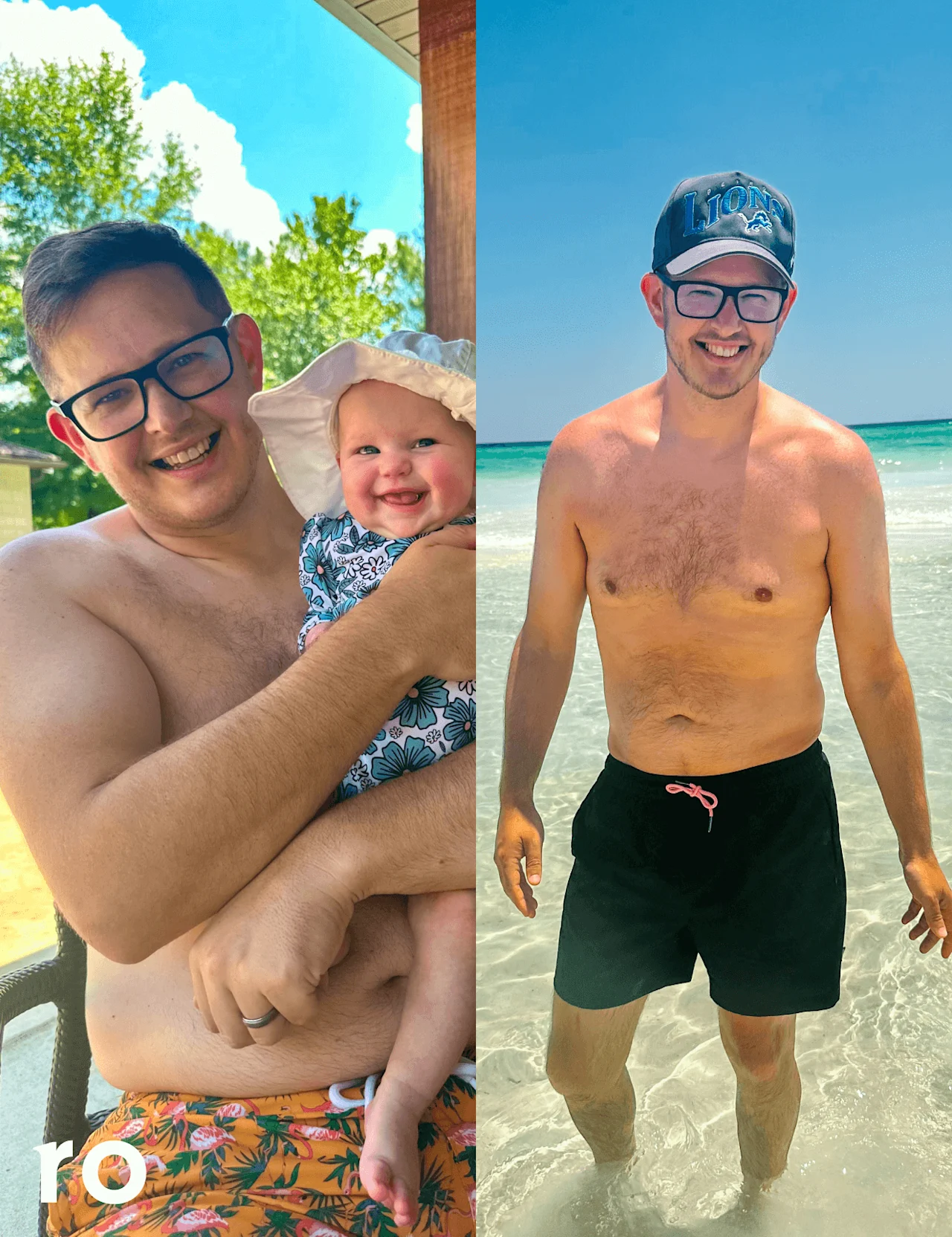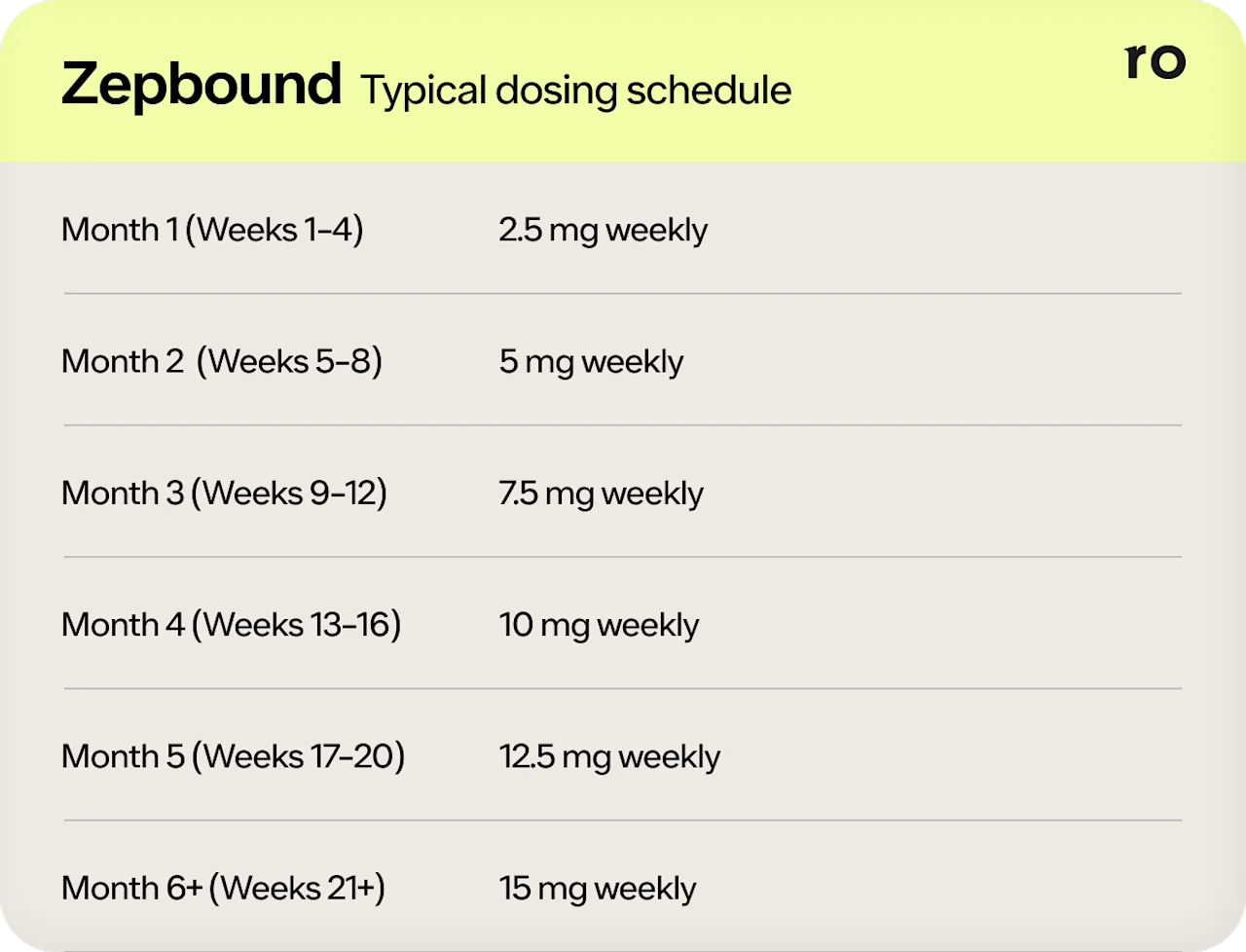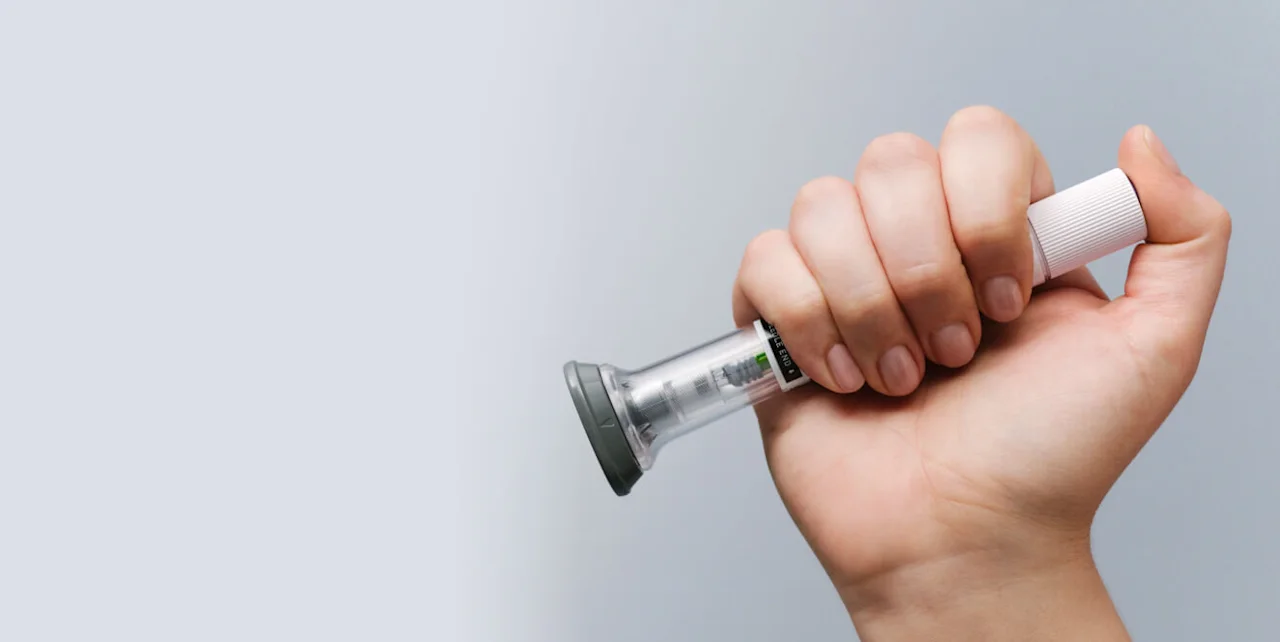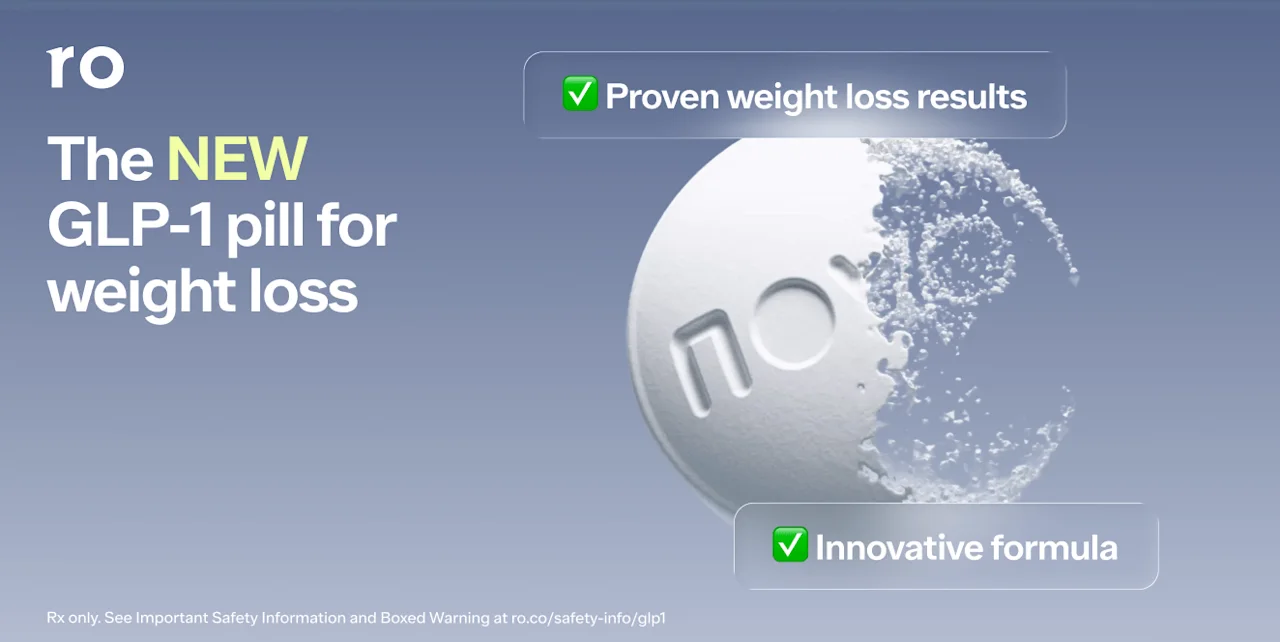Key takeaways
Zepbound (tirzepatide) is a once-weekly injection approved to treat obesity and overweight, producing an average weight loss of up to 21% in clinical studies.
Most people start noticing appetite changes and some weight loss within the first 4–8 weeks of taking Zepbound, especially when paired with healthy lifestyle changes.
Factors, such as your starting weight, other health conditions, and the dosage prescribed, can impact your specific weight loss results on Zepbound.
Managing side effects, staying physically active, and tracking progress can help you stay motivated and maximize your Zepbound results during the first two months and beyond.
Here's what we'll cover
Key takeaways
Zepbound (tirzepatide) is a once-weekly injection approved to treat obesity and overweight, producing an average weight loss of up to 21% in clinical studies.
Most people start noticing appetite changes and some weight loss within the first 4–8 weeks of taking Zepbound, especially when paired with healthy lifestyle changes.
Factors, such as your starting weight, other health conditions, and the dosage prescribed, can impact your specific weight loss results on Zepbound.
Managing side effects, staying physically active, and tracking progress can help you stay motivated and maximize your Zepbound results during the first two months and beyond.
If you’ve just started Zepbound (tirzepatide), you’re probably wondering when you’ll notice changes in your appetite. In clinical trials, people taking Zepbound have lost up to 21% of their body weight. The weight loss medication starts working soon after you take it, but how long until you see results?
Zepbound weight loss results can become noticeable within the first few months. Read on to learn what you can expect in the first eight weeks of taking Zepbound.
Getting started with Zepbound: the basics
Zepbound (tirzepatide) is a once-weekly injectable medication that is approved by the US Food and Drug Administration (FDA) to treat obesity and overweight, as well as obstructive sleep apnea (OSA) in people with obesity.
How Zepbound works
Zepbound is a glucagon-like peptide-1 (GLP-1) and glucose-dependent insulinotropic polypeptide (GIP) receptor agonist. It works by mimicking GLP-1 and GIP — two natural gut hormones — in your body, producing effects like:
Slower digestion, so food stays in your stomach longer
More balanced blood sugar levels after you eat
Increased feelings of fullness
Together, these effects cause you to feel full sooner and longer, so you consume fewer calories and lose weight.
Weight loss timeline
In clinical trials, people taking Zepbound lost 15%--21% of their body weight in 72 weeks (about a year and a half). The majority of weight loss occurs within the first year of taking Zepbound.
“As a general rule, those with obesity often lose 1 to 2 pounds per week,” says Pooja Gidwani, MD, MBA, a double board-certified physician in internal medicine and obesity medicine.
First two months of Zepbound weight loss results: week-by-week
How quickly you lose weight on Zepbound can depend on a number of factors, including your starting body weight, other health conditions, the dosage prescribed, and the lifestyle changes made. Remember: Zepbound is a long-term medication for weight loss that works best when you make other lifestyle changes like diet and exercise.
Having said that, here’s an idea of the Zepbound results you might expect during your first two months on the medication.
Week 1: Starting Zepbound
Zepbound is a medication you inject under the skin of your thigh, abdomen, or upper arm once a week. It comes in six dosage strengths ranging from 2.5 mg to 15 mg. Typically, healthcare providers start you on the lowest dose and gradually increase it over a period of months, depending on your response to the medication and tolerance for side effects.
During the first week of starting Zepbound, you probably won’t notice any changes in your body weight. But you’ll likely experience some of the drug’s side effects, which are usually gastrointestinal in nature, says Daniel A. Nadeau, MD, a board-certified endocrinologist. “Most people have nausea and occasionally vomiting or other GI side effects like diarrhea.” Other side effects can include constipation, abdominal pain, and upset stomach or indigestion.
During the first week of Zepbound, it’s important to pay attention to how the drug makes you feel and to stay in touch with your healthcare provider if any side effects are especially persistent or severe.
Tips for getting started with Zepbound:
Choose your injection day wisely. Zepbound should be injected once a week, on the same day each week. Choose a day you feel confident you can stick with. This may be a day when you consistently do the same activity each week, such as laundry, or it may be one when you can rest the following day if the side effects are too intense.
Avoid fatty foods. “Fatty food slows stomach emptying and that can make nausea and GI issues worse,” Dr. Nadeau says. So, instead of a burger and fries (though undeniably delicious!), stick with lighter, healthier eats like berries, lots of greens, and lean proteins.
Stay hydrated. Keeping up with your fluid intake — such as by sipping on water throughout the day or consuming water-rich foods (e.g. soup) — can be your greatest defense against Zepbound side effects. It can help keep your digestion system moving and relieve discomfort from nausea, constipation, vomiting, and diarrhea. Plus, studies show that replacing higher-calorie beverages (e.g. beer, soda, juice) with water can lead to greater weight loss.

Week 2: Managing side effects on Zepbound
As you enter the second week of taking Zepbound, you’ll likely have some idea of what to expect in terms of side effects. So, you can take more proactive steps to get ahead of the discomfort.
You may also notice that “food noise” — aka intrusive, persistent thoughts about food — is starting to quiet down. This can make it easier to stick to a reduced-calorie diet and practice healthier eating habits.
Tips for managing side effects during the second week of Zepbound:
Increase (or temporarily decrease) your fiber intake. High-fiber foods such as whole grains, nuts, fruits, and veggies can relieve constipation on Zepbound. They also boost feelings of fullness, so you’re less likely to overeat and experience nausea or GI discomfort. But if you’re dealing with the opposite (read: diarrhea), you’ll want to temporarily reduce your fiber intake — at least until that side effect subsides.
Adjust how you eat, not just what you eat. Start eating smaller meals, more often rather than larger meals, less often. This can help you avoid feeling too full and experiencing GI distress. Plus, smaller portions can help create a calorie deficit, which is key to promoting weight loss. You’re also going to want to stay upright a while after eating to aid digestion, reduce stomach pressure, and steer clear of side effects. No matter how tempting it might be to plop onto the couch post-dinner, fight the urge by going for an evening stroll.
Boost your NEAT. Short for non-exercise activity thermogenesis, NEAT refers to all the physical activity you do throughout the day that’s not an official workout (think: walking, standing up, taking the stairs, even twiddling your thumbs). Depending on the intensity of Zepbound’s side effects, you may not feel up to starting an exercise routine just yet. But you can begin to increase your NEAT and move away from a sedentary lifestyle. You might set a timer to stand up more often during your workday, clean your house at a clip, walk while on the phone, or park further away from the store when running errands.
Week 3: Establish healthy eating habits
By week three of Zepbound, you’ve hopefully developed some tactics to manage side effects. You can always find more tips in online reviews of Zepbound and Reddit communities, where other people taking the drug share what’s worked for them. But with a symptom-relief toolbox prepped and ready to go, you can start to lay the groundwork for healthy lifestyle changes, like diet and exercise.
Tips for establishing healthy eating habits during the third week of Zepbound:
Adopt a low-calorie diet. Experts generally recommend reducing your caloric intake by 500–750 calories per day when taking a medication like Zepbound. “Weight loss really starts in the kitchen,” Dr. Nadeau says. “It comes down to calories in, calories out, so choosing low-fat foods is really important.” You can squeeze more nutrition — along with more bites — from healthier foods than less-healthy options. Think of it this way: “You can eat a lot of salad compared to a small amount of fatty foods, which have a lot of calories,” Dr. Nadeau explains.
Swap out old snacks for new favorites. Next time you head to the grocery store, pay attention to nutrition labels and fill your cart with healthy, nutritious foods that fill you up, such as whole foods high in fiber and protein. Leave processed products and foods full of empty calories on the shelf; these are common contributors to weight gain.
Practice mindful eating. Make an effort to eat slower and without distractions. Instead of paying attention to the phone in your hand or TV playing in the background, focus on how the food feels and tastes as you chew. And once you start to feel full, stop eating — even if there’s food still left on your plate. This technique can help you tune into your hunger and fullness cues, which can be helpful throughout the weight loss process.
Week 4: Incorporating more movement
As you near the end of your first month on Zepbound, it’s time to start making moves — literally. Zepbound works best when paired with diet and exercise, and now that you have a good handle on the side effects, you may be feeling more up to move. Plus, studies show that exercise can have an appetite-suppressing effect, so why not add more movement to your daily routine?
Tips for incorporating more movement during the fourth week of Zepbound:
Walk daily. “Exercise moves things forward and accelerates the weight loss,” Dr. Nadeau says. To start, he recommends walking for at least 30 minutes every day.
Add in resistance training. Strength training is key for preserving muscle tone while taking Zepbound and ensuring that the weight you lose comes from body fat instead of muscle. Dr. Nadeau recommends that his patients work out a different muscle group daily. “If you can only do a few sets, that’s fine, but if you can, try to do it to exhaustion. Some studies show that pushing to complete exhaustion, even if it doesn’t take that much time, makes a big difference.”
Schedule exercise. It’s easier to stick to a habit when it’s on the calendar — and exercise is no different. So, instead of trying to squeeze in a workout on a whim after a long day of work — which can often be stressful and make exercise even more intimidating or unenjoyable — plan your workouts in advance. This ensures exercise fits into your daily routine and sets you up for success.

Week 5: Increasing your dosage
Would you look at that? You’ve officially made it through the first month of taking Zepbound! Go ahead and give yourself a pat on the back.
Now, what should you expect? At this point, the medication should have reached a steady concentration in your bloodstream. So, you may start to see more changes, especially in terms of your appetite and body weight. In clinical trials, people lost an average of 5–10 pounds by week five of treatment.
But every patient is different, so don’t beat yourself up if you haven’t seen the number on the scale drop as significantly. And if that’s the case for you (and you’re not struggling with side effects), your healthcare provider may increase your dosage to 5 mg weekly.
While people on higher dosage strengths of Zepbound tend to lose more weight, they also may experience more side effects. So, for many, week five of treatment may be all about managing side effects while maintaining a new diet and exercise routine.
Tips for dealing with a dosage increase during the fifth week of Zepbound:
Stay on top of side effects. Usually, Zepbound’s side effects are at their worst when you start the medication and with each dosage increase. Be ready to rely on the tactics that helped you earlier in treatment, including staying hydrated, avoiding fatty foods, and practicing healthy eating habits (e.g. portion control, mindful eating).
Try new nausea relief methods. Nausea is the most common side effect of Zepbound, affecting at least one in four people taking the medication. If your nausea worsens during week five, opt for bland, easy-on-the-stomach foods, like crackers. Ginger, apples, and mints can offer additional relief, as can avoiding strong smells and getting some fresh air and a light walk. (If your nausea is especially severe or doesn’t go away, check in with your healthcare provider.)
Don’t avoid eating (unless you’re full). “Under-eating can stall weight loss by increasing stress hormones and slowing the metabolism,” Dr. Gidwani says. “I often have to coach patients to eat more frequently. Eat enough, not less.” Again, if you're feeling nauseous, light, water-rich foods can help you stay on track during a dosage increase. Soups and yogurt can be your friends.
Week 6: Optimizing weight loss
“While appetite changes can occur early, meaningful fat loss typically begins around 4–8 weeks, once patients reach a dose that provides noticeable appetite regulation,” Dr. Gidwani says. That makes week six a great time to start adopting habits that can accelerate your weight loss results.
Tips for optimizing weight loss during the sixth week and onward:
Pump up the protein. Similar to fiber, protein keeps you feeling full longer. It (along with strength training workouts!) is also essential for building and preserving muscle. The more lean muscle mass you have, the more calories you’re able to burn at rest — and this can help boost your weight loss results. Dr. Gidwani recommends including at least 20–30 grams of protein per meal to preserve lean muscle mass while taking Zepbound.
Adopt a positive mindset. Staying positive means not only being your own personal cheerleader during a hard workout but also when you take a misstep. It’s normal to “give in” to a less-than-healthy snack or skip a day of exercise now and then — hey, you’re only human. The important part is to give yourself a break and get back to it the next day. Remember: Good is better than perfect!
Track your results (if it’s helpful). Some people find tracking their progress can help them stay motivated and achieve their goals. Sound like you? Then lean into it! You can keep a weight loss journal, chronicling regular weigh-ins, measurements, dietary changes, and even daily steps. Other options include using a fitness app or smart smartwatch or taking periodic selfies.

Week 7: Building muscle
Week seven of taking Zepbound and the vibes are likely high. By now, your appetite has fully changed, and you may have seen its effects in your clothes, too. “Body recomposition can occur before major scale changes,” Dr. Gidwani says. “Many of my patients will drop inches and clothing sizes before they hit big milestones on the scale.”
Now, you may be itching to accelerate your results. It’s a perfect time to focus on building your muscle strength.
Tips for staying strong during the seventh week of Zepbound:
Level up your NEAT. In week two, you started incorporating more non-exercise activity throughout your day. Now that you have more energy, it’s time to take your movement to the next level. Consider doing stretches while you read or watch television. Play music while you clean your house, so you can dance and get your heart pumping even more. Make heavy grocery bags your friends; instead of asking for help toting them from the car to the kitchen, try to carry a few at a time to work those upper arm muscles.
Work out longer. As you head toward the third month of Zepbound treatment, start increasing the length of your workouts. This could mean adding another 15 minutes to your daily walks or gym sessions. Health experts generally recommend a weekly minimum of 150 minutes of exercise per week or 30 minutes of exercise for five days. But research suggests that working out more (up to 60 minutes per day) can lead to more significant weight loss.
Work out harder, too. Working out longer will naturally make your sweat sessions harder. But if you’re ready for an extra challenge, consider amping up the intensity of your exercise even further. When lifting weights, reach for heavier dumbbells instead (but only if you can use them safely!). When going for a run or biking, try adding in bursts of moderate to high intensity sprints.
Week 8: Staying motivated moving forward
Once you’ve reached your eighth week on Zepbound, you’ve probably noticed some significant changes in how you feel and look. In one study involving people with type 2 diabetes, participants reported feeling significantly fuller during the day at this point — even though they were consuming about 200–300 fewer calories per day. They also lost nearly 10 pounds. Now, it’s all about keeping up your momentum moving forward.
Tips for staying motivated during the eighth week of Zepbound and beyond:
Celebrate your wins. If you’ve been tracking your Zepbound results in a journal, take a moment to celebrate whenever you reach a milestone — be it a new number on the scale, a smaller clothing size, or a newfound ability to, say, go for steeper hikes.
Find a weight loss buddy. Research shows that people who find a weight loss “buddy” tend to lose more weight and shave more inches off their waistlines than those who go at it alone. Find someone to share this journey with you, whether it’s a friend, coworker, or someone you meet online.
Be kind to yourself. Even though the pounds might be reliably melting away at this point, remember that weight loss is not a linear process. There may be times when things level out or slow down. That’s okay. Stick with it, and stay in touch with your healthcare provider if you think they’re slowing down a bit too much — they can recommend tips for pushing through a weight loss plateau.
What happens after 8 weeks of Zepbound?
After the first two months of Zepbound, your healthcare provider may increase your dose again — first to 7.5 mg weekly. Or, on the flip side, your healthcare provider may slow titration to see if you can continue losing weight on a lower dose while also making more changes to your diet and exercise routine.
Independent of your specific dosage, people typically experience continued weight loss past the eight-week mark and well into their second year of taking Zepbound. For example, here’s the average amount of weight loss people experienced in one study of Zepbound:
About 8% of body weight after three months
Up to 15% of body weight after six months
Up to 21% of body weight after a year and a half
Moving forward, you’ll want to continue to stay in regular contact with your healthcare provider. This way, they can see how the medication is working for you and make any changes to your dosage regimen, if necessary.
Some people may eventually hit a plateau at their current dosage and will need to increase it to jumpstart the weight loss again, Dr. Gidwani says.

How to maintain Zepbound weight loss results after 8 weeks
When you’ve made it through the first eight weeks of taking Zepbound, it’s time to give yourself a hearty pat on the back. From changing your diet and movement routine to handling the side effects, you’ve definitely earned it!
Next up on your to-do list? Keep up the good work, stay positive, and look for new ways to support your healthy lifestyle moving forward.
1. Stay consistent
During the first two months of taking Zepbound, you laid the groundwork for a new lifestyle that supports a healthier you overall.
Sticking to that new structure — instead of relying solely on the drug to suppress your appetite — is what will help you continue to lose weight and feel healthier, Dr. Gidwani says. “Zepbound works best when you still commit to planning meals, avoiding skipping meals, and keeping consistent timing — especially for those with a history of binge eating or dysregulation.”
Another place to stay consistent? Your exercise routine. Not only can regular exercise increase your body’s natural GLP-1 levels, but it can also help you better maintain your weight loss results if and when you stop taking a GLP-1 medication. In a study of people with obesity, participants who took a GLP-1 and regularly exercised for one year maintained more of their initial weight loss than those who just took a GLP-1 or exercised.
2. Sleep well
“Sleep timing, light exposure, and meal timing all affect GLP-1 efficacy,” Dr. Gidwani says. “I often tell patients, ‘If you're scrolling at midnight and skipping breakfast, you're blocking your own progress.’”
Indeed, research consistently shows that regularly getting too little sleep can lead to overeating and obesity. At the same time, people who regularly enjoy a healthy amount of sleep — around 7–9 hours per night — tend to lose more weight and body fat. If you’re feeling tired on Zepbound, follow these tips for better sleep:
Adopt a consistent sleep schedule, going to bed and waking up at the same time every day
Maintain a regular exercise routine
Practice meditation
Create a calming bedtime routine
Avoid caffeine, alcohol, and heavy meals later in the day
Limit your use of electronics at night
3. Manage your stress
Stress can be a friend or foe when it comes to weight loss. For starters, it can make it tough to sleep, creating a vicious cycle of stress and exhaustion that can prevent weight loss as quickly as you may have hoped.
What’s more, stressed-out people tend to overeat, especially on foods high in sugar, calories, and fat. They often also lose some of their motivation for sticking to their exercise routine and weight loss goals.
On the other hand, research shows that people who practice stress management techniques during their weight loss journey tend to lose more weight.
Dr. Nadeau recommends finding ways to convert stress into a positive activity. For example, if you’ve previously used eating to comfort or soothe yourself, consider doing one of these tactics instead:
Getting some fresh air with a short walk
Sweating it out at the gym
Calling a friend you can vent to
Practicing deep breathing exercises
Writing how you feel in a journal
Meditating
Giving yourself a massage
Singing along to a song that matches your mood
4. Listen to your gut
“Generally, when you go on a medication like Zepbound, your tastes change,” Dr. Nadeau says. “People might move from having a burger for lunch everyday to realizing that now that they’re on Zepbound, they can’t do — or don’t want to do — that. They might be drawn toward a salad instead.”
And science backs this up: Research shows that people taking GLP-1s report fewer cravings and desire for foods that are particularly sweet, salty, or fatty.
When you hear that inner voice, try to listen to it, Dr. Nadeau says. Meals that used to be your favorites when you go out to eat may just not appeal to you anymore, and that’s okay. If you’re craving something healthy, eat that instead.
The more you do this, the more you create a positive feedback loop: When you’re craving something healthy, you order it and enjoy it, and the next time, it becomes easier to make the healthy choice.
5. Stay in touch with your healthcare team
Finally, keep in regular contact with your healthcare provider. As long as you’re continuing to lose weight, your provider may keep you at your current dosage of Zepbound. But if you’re still tolerating it well and the weight loss begins to slow, it can be a sign that it might be time to titrate up to a higher dosage, Dr. Nadeau says.
Your healthcare provider can also give you other suggestions for maximizing your weight loss on Zepbound, from connecting you with a physical therapist or referring you to a dietitian who can put together a custom Zepbound diet plan for you.
Bottom line
Zepbound is a powerful medication for weight loss, with clinical trials showing people can lose up to 21% of their body weight in about a year and a half. But for many people, the first signs of progress — e.g reduced appetite and early weight loss — show up within the first two months of taking Zepbound.
Get excited for some early results. You may notice a reduced appetite and some changes in your body during the first 4–8 weeks of taking Zepbound, especially if you're consistent with injections and eating healthier.
Side effects are common, but usually manageable. Most people experience GI side effects like nausea, especially during the first few months of treatment. Staying hydrated, avoiding fatty foods, and eating mindfully can help.
Zepbound works best when paired with healthy habits. To maximize your weight loss results on Zepbound, implement lifestyle changes like a healthier diet, increased physical activity, and better sleep.
Track your progress (and your wins!). Selfies, body measurements, and food journaling can help you notice Zepbound results even before they appear on the scale.
Stick with it — and your team. As your weight loss journey continues, regular check-ins with your healthcare provider can help ensure you’re taking the most effective dosage, push through plateaus, and keep your momentum going strong.
Frequently asked questions (FAQs)
How much weight can I lose per month with Zepbound?
People with obesity may lose 4–8 pounds per month (or 1–2 pounds per week) when taking Zepbound, Dr. Gidwani says. Over the course of a year, that may lead to an average weight loss of 13.6%–17.5%, according to one study.
How fast can you start losing weight on Zepbound?
The majority of weight loss on Zepbound occurs during the first year of taking the medication. Zepbound starts working soon after you start taking it, with some people losing a little over 5 pounds during the first five weeks. (Other folks may lose even more.)
What are the results of Zepbound for 3 months?
While Zepbound weight loss results can vary, one study found that people lost an average of 13 pounds during the first three months. People also report a significant reduction in their overall caloric intake and appetite during this time.
How long does it take to see results on Zepbound?
Zepbound results may become noticeable within the first 4–8 weeks of taking the medication. By that time, people may eat about 200 fewer calories daily, experience some weight loss, and report feeling more full during the day.
How effective is Zepbound for weight loss?
Zepbound can be very effective for weight loss, with people losing between 15% and 21% of their body weight in less than a year and a half, according to clinical trials. Most Zepbound-driven weight loss occurs within the first year of taking the weight loss medication.
DISCLAIMER
If you have any medical questions or concerns, please talk to your healthcare provider. The articles on Health Guide are underpinned by peer-reviewed research and information drawn from medical societies and governmental agencies. However, they are not a substitute for professional medical advice, diagnosis, or treatment.
Zepbound Important Safety Information: Read more about serious warnings and safety info.
GLP-1 Important Safety Information: Read more about serious warnings and safety info.
References
Akhlaghi, M. (2024). The role of dietary fibers in regulating appetite, an overview of mechanisms and weight consequences. Critical Reviews in Food Science and Nutrition, 64(10), 3139–3150. doi: 10.1080/10408398.2022.2130160. Retrieved from https://pubmed.ncbi.nlm.nih.gov/36193993/
Aldawsari, M., Almadani, F. A., Almuhammadi, N., et al. (2023). The Efficacy of GLP-1 Analogues on Appetite Parameters, Gastric Emptying, Food Preference and Taste Among Adults with Obesity: Systematic Review of Randomized Controlled Trials. Diabetes, Metabolic Syndrome and Obesity: Targets and Therapy, 16, 575–595. doi: 10.2147/DMSO.S387116. Retrieved from https://pmc.ncbi.nlm.nih.gov/articles/PMC9987242/
Almandoz, J. P., Wadden, T. A., Tewksbury, C., et al. (2024). Nutritional considerations with antiobesity medications. Obesity, 32(9), 1613–1631. doi: 10.1002/oby.24067. Retrieved from https://onlinelibrary.wiley.com/doi/10.1002/oby.24067
Baranwal, N., Yu, P. K., & Siegel, N. S. (2023). Sleep physiology, pathophysiology, and sleep hygiene. Progress in Cardiovascular Diseases, 77, 59–69. doi: 10.1016/j.pcad.2023.02.005. Retrieved from https://pubmed.ncbi.nlm.nih.gov/36841492/
Bracamontes-Castelo, G., Bacardí-Gascón, M., & Jiménez Cruz, A. (2019). Effect of water consumption on weight loss: a systematic review. Efecto del consumo de agua sobre la pérdida de peso: revisión sistemática. Nutricion Hospitalaria, 36(6), 1424–1429. doi: 10.20960/nh.02746. Retrieved from https://pubmed.ncbi.nlm.nih.gov/31657610/
Cox, C. E. (2017). Role of Physical Activity for Weight Loss and Weight Maintenance. Diabetes Spectrum: A Publication of the American Diabetes Association, 30(3), 157–160. doi: 10.2337/ds17-0013. Retrieved from https://www.ncbi.nlm.nih.gov/pmc/articles/PMC5556592/
Dailey, R., Romo, L., Myer, S., et al. (2018). The Buddy Benefit: Increasing the Effectiveness of an Employee-Targeted Weight-Loss Program. Journal of Health Communication, 23(3), 272–280. doi: 10.1080/10810730.2018.1436622. Retrieved from https://pubmed.ncbi.nlm.nih.gov/29452062/
de Carvalho, K. M. B., Pizato, N., Botelho, P. B., et al. (2020). Dietary protein and appetite sensations in individuals with overweight and obesity: a systematic review. European Journal of Nutrition, 59(6), 2317–2332. doi: 10.1007/s00394-020-02321-1. Retrieved from https://pubmed.ncbi.nlm.nih.gov/32648023/
Dorling, J., Broom, D. R., Burns, S. F., et al. (2018). Acute and Chronic Effects of Exercise on Appetite, Energy Intake, and Appetite-Related Hormones: The Modulating Effect of Adiposity, Sex, and Habitual Physical Activity. Nutrients, 10(9), 1140. doi: 10.3390/nu10091140. Retrieved from https://pmc.ncbi.nlm.nih.gov/articles/PMC6164815/
Epstein, L. H., Leddy, J. J., Temple, J. L., et al. (2007). Food reinforcement and eating: a multilevel analysis. Psychological Bulletin, 133(5), 884–906. doi: 10.1037/0033-2909.133.5.884. Retrieved from https://pmc.ncbi.nlm.nih.gov/articles/PMC2219695/
Gorgojo-Martínez, J. J., Mezquita-Raya, P., Carretero-Gómez, J., et al. (2022). Clinical Recommendations to Manage Gastrointestinal Adverse Events in Patients Treated with Glp-1 Receptor Agonists: A Multidisciplinary Expert Consensus. Journal of Clinical Medicine, 12(1), 145. doi: 10.3390/jcm12010145. Retrieved from https://pmc.ncbi.nlm.nih.gov/articles/PMC9821052/
Hamano, S., Sawada, M., Aihara, M., et al. (2024). Ultra-processed foods cause weight gain and increased energy intake associated with reduced chewing frequency: A randomized, open-label, crossover study. Diabetes, Obesity & Metabolism, 26(11), 5431–5443. doi: 10.1111/dom.15922. Retrieved from https://pubmed.ncbi.nlm.nih.gov/39267249/
Hamasaki, H. (2018). Exercise and glucagon-like peptide-1: Does exercise potentiate the effect of treatment?. World Journal of Diabetes, 9(8), 138–140. doi: 10.4239/wjd.v9.i8.138. Retrieved from https://pmc.ncbi.nlm.nih.gov/articles/PMC6107470/
Heise, T., DeVries, J. H., Urva, S., et al. (2023). Tirzepatide reduces appetite, energy intake, and fat mass in people with type 2 diabetes. Diabetes Care, 46(5), 998–1004. doi: 10.2337/dc22-1710. Retrieved from https://pmc.ncbi.nlm.nih.gov/articles/PMC10154650/
Jastreboff, A. M., Aronne, L. J., Ahmad, N. N., et al. (2022). Tirzepatide once weekly for the treatment of obesity. New England Journal of Medicine, 387(3), 205–216. doi: 10.1056/nejmoa2206038. Retrieved from https://www.nejm.org/doi/full/10.1056/NEJMoa2206038
Jensen, S. B. K., Blond, M. B., Sandsdal, R. M., et al. (2024). Healthy weight loss maintenance with exercise, GLP-1 receptor agonist, or both combined followed by one year without treatment: a post-treatment analysis of a randomised placebo-controlled trial. EClinicalMedicine, 69, 102475. doi: 10.1016/j.eclinm.2024.102475. Retrieved from https://pmc.ncbi.nlm.nih.gov/articles/PMC10965408/
Kim, J. Y. (2021). Optimal Diet Strategies for Weight Loss and Weight Loss Maintenance. Journal of Obesity & Metabolic Syndrome, 30(1), 20–31. doi: 10.7570/jomes20065. Retrieved from https://www.ncbi.nlm.nih.gov/pmc/articles/PMC8017325/
Kline, C. E., Chasens, E. R., Bizhanova, Z., et al. (2021). The association between sleep health and weight change during a 12-month behavioral weight loss intervention. International Journal of Obesity (2005), 45(3), 639–649. doi: 10.1038/s41366-020-00728-8. Retrieved from https://www.ncbi.nlm.nih.gov/pmc/articles/PMC7914147/
Liu, Q. K. (2024). Mechanisms of action and therapeutic applications of GLP-1 and dual GIP/GLP-1 receptor agonists. Frontiers in Endocrinology, 15, 1431292. doi: 10.3389/fendo.2024.1431292. Retrieved from https://pmc.ncbi.nlm.nih.gov/articles/PMC11304055/
Malaeb, S., Perez-Leighton, C. E., Noble, E. E., et al. (2019). A "NEAT" Approach to Obesity Prevention in the Modern Work Environment. Workplace Health & Safety, 67(3), 102–110. doi:10.1177/2165079918790980. Retrieved from https://pubmed.ncbi.nlm.nih.gov/30370831/
McCarthy, D. & Berg, A. (2021). Weight loss strategies and the risk of skeletal muscle mass loss. Nutrients, 13(7), 2473. doi: 10.3390/nu13072473. Retrieved from https://www.ncbi.nlm.nih.gov/pmc/articles/PMC8308821/
Tomiyama, A. J. (2019). Stress and Obesity. Annual Review of Psychology, 70, 703–718. doi: 10.1146/annurev-psych-010418-102936. Retrieved from https://www.annualreviews.org/doi/10.1146/annurev-psych-010418-102936
U.S. Food & Drug Administration (FDA). (2025). Highlights of Prescribing Information: Zepbound (tirzepatide) injection for subcutaneous use. Retrieved from https://www.accessdata.fda.gov/drugsatfda_docs/label/2025/217806Orig1s020lbl.pdf
Xenaki, N., Bacopoulou, F., Kokkinos, A., et al. (2018). Impact of a stress management program on weight loss, mental health and lifestyle in adults with obesity: a randomized controlled trial. Journal of Molecular Biochemistry, 7(2), 78–84. Retrieved from https://pubmed.ncbi.nlm.nih.gov/30568922/
Zhao, L., Cheng, Z., Lu, Y., et al. (2024). Tirzepatide for Weight Reduction in Chinese Adults With Obesity: The SURMOUNT-CN Randomized Clinical Trial. JAMA, 332(7), 551–560. doi: 10.1001/jama.2024.9217. Retrieved from https://pmc.ncbi.nlm.nih.gov/articles/PMC11337071/














